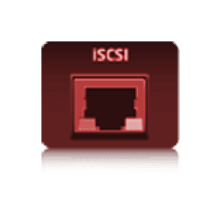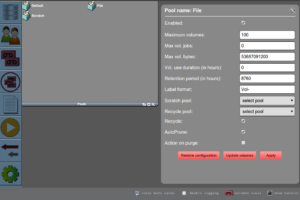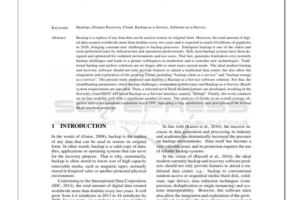For performance issues, you should only use iSCSI to present storage disk to your Bacula Storage Daemon for backup writing. Always avoid CIFS or NFS sharing since they have natural protocol limitations.
1. Install iscsi tools:
# CentOS & RedHad yum install iscsi-initiator-utils # Ubuntu & Debian apt-get install open-iscsi
If your storage requires you will need to know the unique name of your server iSCSI in order to access the disks. This information can be fetched or changed at the following file:
cat /etc/iscsi/initiatorname.iscsi
2. Start the iscsi daemon:
# CentOS & RedHad service iscsi start # Ubuntu & Debian service open-iscsi start
3. In your NAS web console, create the disk and/or pool that Bacula will access. I’m not using password authentication at this tutorial. If you need the IQN of your Bacula machine, fill it with the information fetched in step 1.
4. Test the connection and fetch your STORAGE IQN. From the Bacula server:
iscsiadm -m discovery -t sendtargets -p 10.103.24.9
5. Now login to your storage for the first time. Replace the example IQN for the one obtained in the last step:
iscsiadm -m node --targetname "iqn.1992-05.com.emc:fcn001323222870000-1-vnxe" --portal "10.103.24.9:3260" --login
6. Verify the dmesg messages in order to verify the disk presentation to the operating system:
dmesg
7. You should be able to see the new disk device with the command:
fdisk -l
8. Create a new partition with fdisk(e.g. – follow fdisk partition creating
commands):
fdisk /dev/sdb
9. Create a FS:
mkfs.xfs /dev/sdb1
10. Fetch your storage disk unique ID:
blkid /dev/sdb1
11. Use the information to add a new line to fstab, so the storage is always mounted to the Operational System:
vi /etc/fstab # add similar line UUID=50b6c967-f903-4144-880d-e85c64c8905b /mnt/backup xfs _netdev,user=bacula,rw 0 0
12. Mount your new disk:
mount /mnt/backup
13. Make sure your Bacula Storage all daemon disk devices from the desired Autochanger has “Archive Device” configured to write backups to the same path:
Archive Device = /mnt/backup
Disponível em:  Português (Portuguese (Brazil))
Português (Portuguese (Brazil)) English
English Español (Spanish)
Español (Spanish)





Tank you very much, great article! Just a little typo: at the point 11 the line is
# xfs filesystem, not ext4
UUID=50b6c967-f903-4144-880d-e85c64c8905b /mnt/backup xfs _netdev,user=Postgres Pro,rw 0 0
Hello Andrea,
Sure. If using xfs it is necessary to use the same FS in fstab.
Regards,